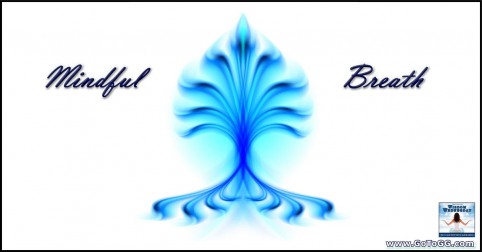A Mindful Breath
A Mindful Breath
Breath has long been used by those who teach meditation as a portal into consciousness.
Breath integrates your mind-body relationship by helping you to release stress and calm your mind while working with your natural physiology to relax.
To use your breath mindfully and consciously can be a powerful way to empower your life.
Every breath we take, every step we make can be filled with peace, joy, and serenity.
– Thich Nhat Hanh
Today, I will lead you through the technique of mindful breathing. As you sit, you can use this technique as a little consciousness shift in the midst of your day.
You can use this mindful breathing exercise as often as you like, and do it as often as you need. The awareness and stress release it brings will be effective almost immediately.
This technique only involves breathing, which certainly you do all of the time. However, I take this technique one step further to increase your consciousness and your awareness by breathing mindfully.
I suggest that to experience a mindful breath most effectively that you, as much as you are able, set aside 5 minutes or so without distractions or interruptions. If possible mute your phone. If you can, close your door and ask your co-workers or family to give you a few undisturbed minutes.
Let yourself calm your mind and open your heart as you do this simple mindful breath meditation.
To quiet the mind of meaningless chatter, to calm the emotions to peaceful repose and then to receive the Transcendent Love of the Soul is the joy of meditation that is available anytime, anywhere you are, once you learn how to meditate daily.
– Genevieve Gerard
A Mindful Breath Meditation
To begin, sit up straight, with your spine vertically aligned.
Along your spine, about 2-3 inches behind your physical spine, are energy centers that are called chakras. As you align your physical spine imagine that all of your energy is also aligned.
You might be aware of the sense of being in alignment that results from aligning your spine.
Place your feet on the floor. This helps you relax. It also helps you ground your energy and be mindful of the connection to the flow of the earth’s energy.
Consciously and with intention, let your energy gently come to center in your heart.
Take a deeply relaxing and centering breath and as you do so consciously enter into this present moment. Let the past go into the past where it truly is. Bring your awareness into the NOW. You are right here, right now. It is right now, right here.
Begin, by inhaling another really deep breath, bringing the air in through your nose. Relax your diaphragm and let the mindful breath begin energetically at your solar plexus chakra.
Then, bring the air into your chest and as you do this consciously open the energy of your heart to expand and open.
Then bring the breath into your lungs, all the way to the top of your lungs, letting your lungs expand and letting your whole being expand. Bring the breath in; filling your lungs as fully as you are able, bringing the air into the upper lung until it is just below your shoulders.
When you have filled your lungs as fully as you are able, release the breath through your mouth until you have released all of the air.
This is a relaxing breath. You might already be mindful of how much more relaxed and at peace you feel, having fully experienced a full breath.
With the release of the breath, you can also release any tension or anxiety you may have been holding.
Let your breathing return to normal.
As you breathe normally, be mindful that you are the one breathing in and you are the one breathing out.
Be aware that your body has the wisdom to take in with every breath exactly what you need and to let go of what no longer serves you.
Before you take another deep and relaxing breath, come consciously into the present. Again, consciously put the past behind you and relax. As you pause, appreciate the magnificent power and unlimited potential that is available to you, right here and right now.
When you affirm that the past is truly now behind you, realize that it has no further power over you, or influence over you, except what you choose to give it.
What will be the future is just beginning to be created, as you let yourself relax and reside in the peace and the presence of the eternal NOW.
It is in the eternal NOW that your Higher Self resides. This moment, this peace, this presence is available to you. It responds to your invocation and invitation.
When you are ready, begin to draw in another deep relaxing and healing breath, in through your nose starting at your diaphragm, through your solar plexus. Let the breath clear away any tension or stress you are holding there. As you bring the breath into your chest to your heart chakra, let your heart fill with love as you open your heart to receive love in and give love out.
Then bring the breath to the top of your lungs, drawing in as much air as you can hold.
Then as you release this breath, through your mouth, it may form a sound like a sigh as you let go of any stress or concerns and let yourself relax, releasing with the breath any tension or anxiety you may have been holding, letting it completely drift away.
Observe and be mindful of what you are feeling and experiencing.
Observe that you are the one breathing in and breathing out. You are the one who is experiencing the whole cycle of your breath. Know that you can choose to breathe with control or naturally.
Now, breathe naturally not attempting to control your breath, allowing your breath to direct how much you bring in and how much you let go of that you no longer need. You might notice a calm and peace filling you at this time. You might be aware that you are more present and aware.
Remember, having consciously released the past you have opened to the profound peace and potential of the eternal now. You are now open to the possibility of creating a new future that incorporates more of your purpose in life and fulfills your heart’s desire.
While taking one more really deep relaxing and filling breath with intention, invoke and invite the Presence of your Higher Self.
Imagine a golden Light coming from your Higher Self, infusing the air you are breathing in deeply.
Let this Light circulate through your whole being with your breath through your solar plexus. Let it calm you, releasing your fears and frustrations with its healing Light.
As the breath circulates from your lungs to your heart and from your heart throughout every atom of your body, the healing light balances you, restores and refreshes you.
As it moves from your lungs to your heart and throughout your whole physical body and energy body, accept the healing power and the profound love into your conscious awareness, into your heart and mind.
As you exhale, breathe out and release any negative thoughts or fears.
With each exhale, release any limiting beliefs that keep you from expressing the magnificent and full being that you truly are.
Now sit in silence and receptivity. Use this interlude to listen for the still prompting of your Higher Self.
In this pause you can offer up any issue or concern on which you would like greater insight or understanding from the guidance of your Higher Self.
Let your breathing return to natural. Bring your attention and awareness back to your physical body.
Observe the background sounds that surround you. Become aware of the smells, the quality of the light, and observe how you feel. Let your mind return to this present moment.
You might notice how much more relaxed and centered you feel. You might feel more empowered and aligned in your being.
To finish up, give gratitude to your Higher Self for any insights and clarity you may have received in this mindful breath meditation.
– GG
I invite and encourage you to practice this mindful breathing meditation often and let your body and mind relax and your heart be comforted.
Namaste,
Genevieve
The Blessing of Love on All that You Do!
QUICK FACT: This post has been viewed 8,780 times. Check out our other related posts below or in the Hot Topics sidebar.
Hand-Pick Related Posts You Might Also Like
- The Breath of Life
- Mindfulness and Meditations For Daily Joy: Taking Mindfulness to the Soul Level
- Discover How To Meditate
-
Recommended Meditation
Gift of Relaxation Guided Visualization Meditation
A Guided Visualization To Release Stress
Last updated 8-5-2020
About the author:
Genevieve Gerard teaches Transformational Consciousness – from first awakening to enlightened Soul awareness. She helps you experience the joy that results from the spontaneous “touch of your soul.”
Read more details…
Genevieve has a Bachelor’s Degree in Philosophy and Theology and a Master of Arts Degree in Counseling and for over thirty years has worked one-on-one with people who were recovering from devastating disabilities and chronic pain. Teaching the mastery of the mind-body relationship she was one of the early professionals trained in biofeedback, visualization, imagery, and meditation as essential techniques to help people heal their bodies, heal their emotions, heal their minds, and heal their lives.
Genevieve’s work demonstrates what she knows so well, “It is spiritual connectedness that triggers physical healing and emotional and mental well-being.” Helping people, like you, tap into your higher-self is the power she wields to guide you to heal and transform your life.
Now, with this understanding, she combines the effective techniques she developed over decades teaching mind-body mastery along with her extensive experience in meditation and spiritual development to create a synthesis of mind-body-spirit that delivers complete healing and opens the door to unlimited personal growth and an encounter with your Soul.
In addition to her current life guidance coaching sessions, and workshops performed around the world, Genevieve has produced more than 20+ guided meditations in the last eight years that are available on iTunes, Amazon, CDBaby, and her website.
It is her vision that through your experience with the techniques of awareness, visualization, and meditation, the love of your Soul will touch and transform your life through her writings and products. It is her sincere desire that the potential of a life of joy and celebration that seems to elude so many people can become a reality for you, now and forever.
Browse her life story and read the Touch of the Soul that changed her world. To contact Genevieve, visit her keep in touch page.
Copyright © 2015-2020 Genevieve Gerard and Touch of the Soul LLC. All rights reserved.



